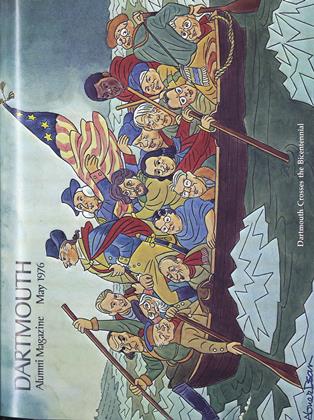The subject was politics and Monte Pascoe '57, the Colorado Democratic Party chairman, and Joseph Blake '58, the Denver County Republican Party chairman, were sharing the Denver Rotary Club platform earlier this year.
It was not the first time these men had met. They attended high school together, went to Dartmouth together, and won the Barrett Cup in successive years. Despite their different political affiliations and a rivalry that each insists is strictly friendly, they are close friends and see each other often, including each Sunday when they attend the same church services.
"We laugh about this often," Blake says. "We're close friends, we're in the Rotary Club and on a hospital board together, and our parents are close." Their politics, and the goals they have set for their respective parties, however, are dramatically different.
Blake, who became vice president of Ticor Mortgage Insurance Company after serving as legislative assistant to Senator Gordon Allott (R-Colo.) and as deputy regional administrator for the Department of Housing and Urban Development, has the difficult task of reinvigorating a Denver GOP that is in danger of becoming a vanishing species. "The registration figures in Denver are tremendously out of balance," Blake says. Democrats outnumber Republicans and independents combined in Denver and, he adds, "We cannot continue to have that sort of imbalance if we're going to make the two-party system work."
Blake's Republicans are trying to attract new people with Republican leanings into the party by opening up leadership positions inside the party and by holding issue sessions in various sections of Denver. "The issue sessions are designed to find out what the Republicans are doing right and wrong," Blake explains. "We're trying to find out if state government is as responsible as it ought to be and we're trying to find needs and to develop policy positions on them. We want to provide an opportunity for citizens themselves to speak. Too often that's done in moribund, mossy political organizations."
While the Republican chairman believes the situation in Colorado is such that "the Republicans have to come back this year," Pascoe is looking to solidify Democratic gains made in recent years.
He says the Democrats made commitments on issues ranging from the environment to equal opportunity legislation and that "to a large extent, the elections of 1976 are about how we implement these commitments."
In 1974, the first election after Pascoe's ascension to the head of the Colorado Democratic Party, the Democrats added a Congressional seat, won the Governorship (Richard Lamm), a second Senate seat (Gary Hart) and elected Sam Brown, who organized the Vietnam moratorium in 1969, the new state treasurer. "We're doing well," Pascoe says, "but one of the great things about politics is that it's the biggest game of chance in town."
Watergate was a factor in the Democrat's successes in 1974 but, this chairman believes, "what we've been doing here in Colorado shows some much larger trends. We've had serious dis- cussions on how we're going to operate this state - what kind of growth we're going to permit, for example."
An unsuccessful candidate for the Denver School Board in a 1969 election that featured debate on court-ordered school busing, Pascoe is responsible for the overall supervision of the party's campaigns, for organizing committees for the state convention, and for meeting with elected public officials. But, he adds, politics is just "an avocation. I'm really a corporate lawyer."
Monte Pascoe '57 (I) and Joe Blake '58took similar poses as Barrett Cup Winners.
 View Full Issue
View Full Issue
More From This Issue
-
 Feature
FeatureSelf-Evident Truths
May 1976 By ARTHUR M. WILSON -
 Feature
FeatureReading and Writing History and Revolutionary Footnote
May 1976 By PAGE SMITH -
 Feature
FeatureWhen Dartmouth Had Its Own State (Almost)
May 1976 By JAMES L. FARLEY -
 Feature
FeatureThanks to Daniel Oliver, A Gathering of Lovers
May 1976 By DAN NELSON '75 -
 Article
ArticleThe Green: A House Mover and an ex-President Proved Who Owns It (Didn't They?)
May 1976 By Jabberwocky, Lewis Carroll, JAMES L. FARLEY '42 -
 Class Notes
Class Notes1923
May 1976 By WALTER C. DODGE, CHARLES J. ZIMMERMAN
D.M.S.
-
 Article
ArticleDial M for Mogul
November 1975 By D.M.S. -
 Article
ArticleFresh Man in Washington
November 1975 By D.M.S. -
 Article
ArticleBasement Admiral
December 1975 By D.M.S. -
 Article
ArticleOf Placemats, Doors and Abraham Clark's Birthday
May 1976 By D.M.S. -
 Article
ArticleIndependence Seeker
May 1976 By D.M.S. -
 Article
ArticleThe Seniors Writ Large: Some Sit Right, Some Don't
June 1976 By D.M.S.
Article
-
 Article
ArticleC. F. CRATHERN '20 RETURNS FROM WORK IN NEAR EAST
November 1921 -
 Article
ArticleMrs. Tucker Dies
May 1944 -
 Article
ArticleGive a Rouse for
September 1986 -
 Article
ArticleFINE ARTS BUILDING GIVEN
FEBRUARY, 1928 By F. P. CARPENTER -
 Article
ArticleComparative Literature
December, 1928 By Prof. H.F. West -
 Article
ArticleHanover Holiday
February 1939 By PROF. HERBERT W. HILL

